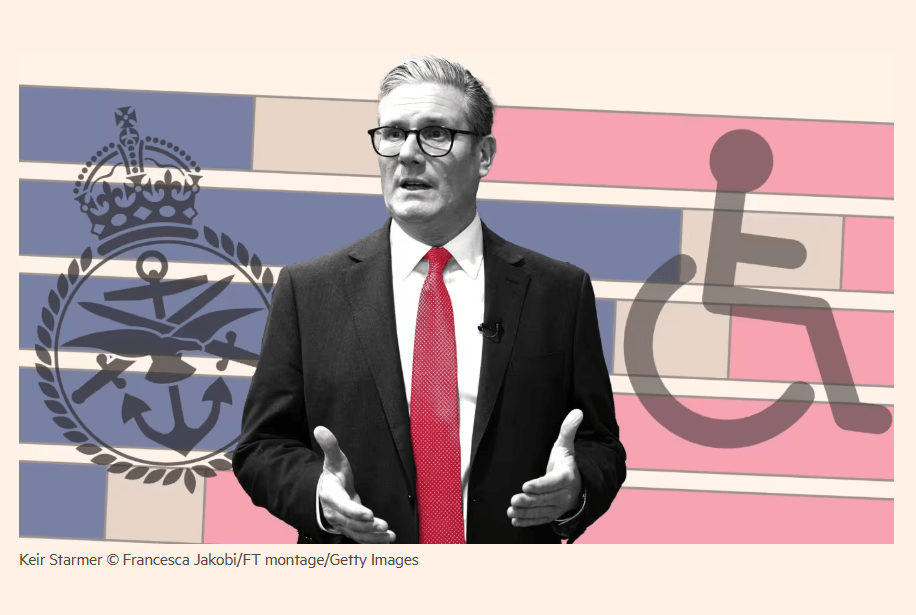As the Chancellor stares down the barrel of a tough Spring Statement, Public First and consultancy Stonehaven have been running a major new research project called The Era of Hard Choices. We’ve looked at the tough trade-offs the Government faces on spending, taxation, and, importantly, how the public wants decisions to be made. We find no easy answers for the Government.
Our first focus is defence – and that’s the subject of coverage in today’s Financial Times.
Rather than just asking if people want to increase spending, we forced them to make trade-offs. Every survey participant saw a set of imagined trade-offs, such as increasing debt to pay for defence spending, or reducing taxes but cutting NHS spending, and were asked to choose between them.
The findings are fascinating. In the UK, the public wants to do more: they think the armed forces are too weak (47%) and want to continue backing Ukraine (40% would offer more support). But they don’t want to fund this through welfare cuts (38% support and 36% oppose) or increased debt (30% support and 33% oppose) – leaving politicians with limited room for manoeuvre.
This is especially hard for the Labour Government. Having already pulled the comparatively easiest lever – cutting overseas aid (which saw 69% support and 13% oppose) – there are very few popular options left for increasing defence spending. The next most popular option for the Government is increasing taxes on businesses (42% support, 26% oppose). Asked separately if it is more important to have a strong military, or for people to be able to live comfortably, a majority of Labour’s current voters would choose the latter (56%).
These trade-offs challenge expectations about voters, and could confuse Labour’s electoral calculations. For example, reducing taxes and the size of the armed forces sees narrow support among Labour voters over increasing taxes and increasing the size of the armed forces (47% to 40%), but splits Reform voters down the middle (40% to 42%) and has narrow opposition among traditionally low-tax Conservatives (37% to 43%).
Our polling finds:
- Broad support for increasing defence spending (57%), but there is almost nothing the public would cut to pay for it. Voters are only willing to sanction reducing overseas aid to cover the rearmament bill. They won’t even sanction bringing down welfare and benefits payments to cover the bill.
- Strong UK support for European defence collaboration — even among Reform voters. 59% of the public would support the UK joining a cross-European armed forces, including 48% of Reform voters.
- A preference for buying military kit from Europe over the US, even if it costs more (44% would buy from Europe even if it takes a bit longer or costs a bit more, 34% would buy cheaply and quickly from the US)
Politicians of all stripes are evidently entering an era where public expectations just don’t add up – and hard choices can’t be avoided. Without these hard choices being made, a renewal moment for investors and the Government is at real risk.
Peter Lyburn, chair of Stonehaven, said: “Voters accept there is a limit to government debt and we are not an era of “win-win” policy choices – if we ever were. But they are not ready to accept the trade-offs required to re-arm or rebuild.
“This polling makes clear that Europe is not, in fact, wakening from its welfare-induced slumber. Political leaders might be, but voters are reluctant to smell the strong coffee.
“Investors and governments who think that Europe’s renewal moment has come must understand where voters are – that they are evidently not yet ready to back the tough decisions that need to be made. Otherwise those in a hurry to rearm or build energy and transport infrastructure may well come unstuck.”
Rachel Wolf, chief executive of Public First, said: “Voters do not see the need to make big trade offs, and they will not immediately reward the politicians who make hard choices. Health, the economy, and migration remain paramount.
That is not a counsel of despair, but it does mean politicians will have to grit their teeth as they raise defence spending, and manage a bumpy political period as they make the argument for its importance.
Read the full FT piece here – and watch this space: we’ll be sharing more from the research in the days and weeks ahead.
Polling tables are available here

